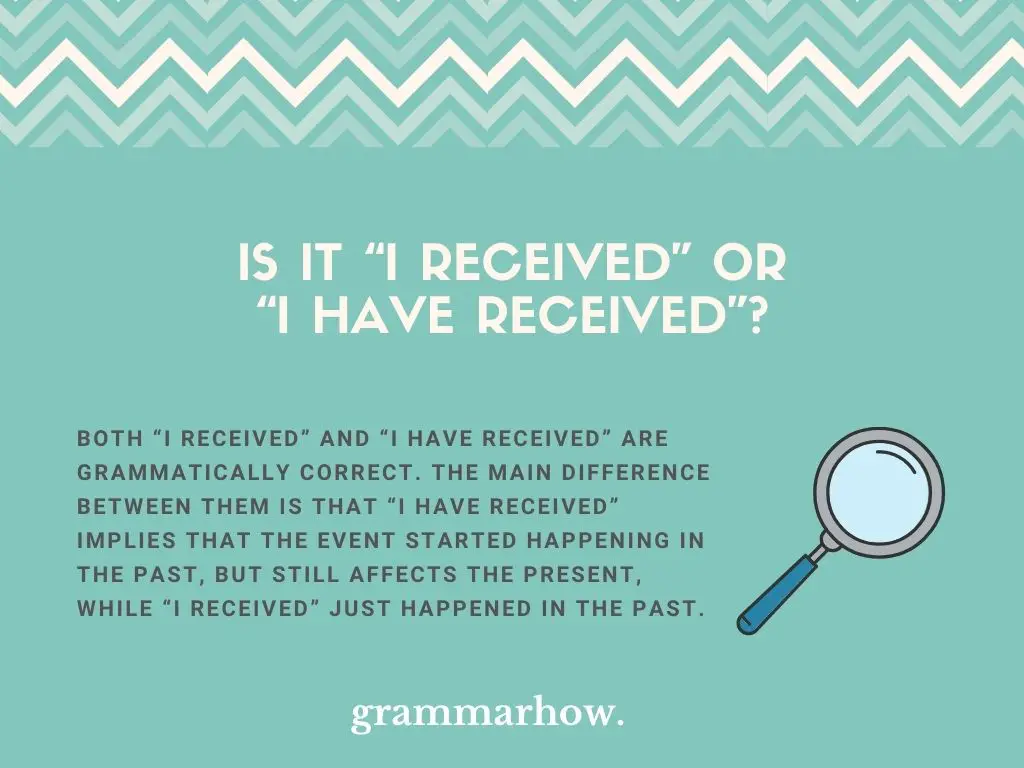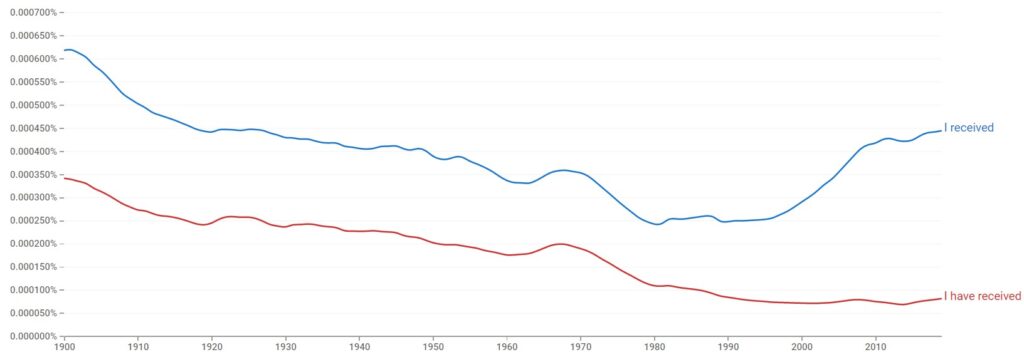Verb tenses in English can be complicated, and it can be confusing to know what tense is best for what situation. Is it better to say “I received” or “I have received”? This article will explain what the main differences are, and when they should be used.
Is It “I Received” Or “I Have Received”?
Both “I received” and “I have received” are grammatically correct. The main difference between them is that “I have received” implies that the event started happening in the past, but still affects the present, while “I received” just happened in the past.

“I received” is in the past simple tense, and it simply means that you received something in the past. This particular something might not have any sort of consequences in the present.
By contrast, “I have received” is in the present perfect tense, and it means that you received something in the past that still has some form of impact in the present.
This impact could be the fact that you’re still receiving it, or that it had long-lasting consequences, or something else entirely.
Is It “I Received Your Email” Or “I Have Received Your Email”?
Both “I received your email” and “I have received your email” are grammatically correct. Which one you use depends on whether the email itself still has some form of impact on the present moment, in which case you’d use “I have received your email”.
The simple past “I received your email” quite simply implies that the email was received, and it gives no information beyond that.
“I have received your email”, on the other hand, hints at the fact that the email is still relevant.
What Does “I Received” Mean?
“I received” is the simple past tense of the verb “Receive”, in first person singular. It means that something was received at some point in the past.
Whatever was received could still have an impact in the present, but not necessarily. “I received” simply means that something was received in the past, and it addresses nothing about the object in the present.
Here’s a few example sentences with the simple past tense of “Receive”:
- I received the package three or four months ago.
- I received your letter a week ago, because it arrived late.
- I received your signal loud and clear, and have since acted on your instructions.
- I received a message from the system administrator last night.
- I received several tiny anonymous gifts from a mysterious stranger.
- I received my online course diploma in the mail the other night.
- I received a set of special coupons as a consequence of being a regular customer.
- I received many fan letters praising our new television show’s writing and characters.
- I received an anonymous message on Twitter with the information we needed.
- I received the products I ordered through Amazon a month ago.
What Does “I Have Received” Mean?
“I have received” is the present perfect tense of the verb “receive”, and it’s used to indicate that something happened in the past and is still affecting the present in some way.
When you use “I have received” instead of “I received”, you’re signaling the fact that whatever it is you received still has some relevance to what is currently happening in the present.
Here’s a few example sentences that properly use “I have received”:
- I have received many love letters, but this one is the best one.
- I have received our instructions for the current project.
- I have received a package from my mother in the mail, but I haven’t opened it yet.
- I have received several letters from our insurance company detailing the situation.
- I have received multiple messages from my boss detailing my progress.
- I have received the latest set of old magazines I ordered online.
- I have received a subscription box online, with random items inside.
- I have received a message from my sister in Hong Kong with her new contact information.
- I have received his latest contact information through an email.
- I have received the information we need to finish writing the article.
Is “I Received” Or “I Have Received” Most Formal?
“I have received” is generally considered to be more formal than “I received”, and sees more use in business emails and communication.
The perfect present tense is generally used more than the simple past in formal writing, as it allows for more immediate specification of the situation at hand.
“I have received” implies more direct relevance between what you have received and the present day, as opposed to “I received”. In “I have received”, what you received is important to the current time.
This means that “I have received” is more immediately useful for formal writing, as it helps clarify any questions in a more efficient way.
“I received” can also be used for something that is still relevant in the present moment, but it’s not necessarily the case with all uses of “I received”.
Are “I Received” And “I Have Received” Interchangeable?
Yes, “I received” and “I have received” can be interchangeable, depending on the context of the sentence.
If the object that was received is somehow relevant to the present moment, then “I have received” is a quick way of subtly communicating that fact to the listener.
However, “I received” can also be utilized in a context where the received object is relevant to the present, it just won’t immediately communicate that fact like “I have received” does.
It should be noted that this distinction appears more in formal contexts, and that in more casual and colloquial contexts, people will use either interchangeably.
Is “I Received” Or “I Have Received” Used The Most?
According to data sourced by the Google Ngram Viewer, “I received” sees a lot more use than “I have received”.

The data showcases the fact that since the year 1900, “I received” has seen more use than “I have received”.
It’s also worth pointing out that the trends for both are nearly identical. When “I received” decreased in use, “I have received” decreased in use as well.
This trend is true for most decades except the 1990s, in which uses of “I received” increased while uses of “I have received” decreased.
When Should I Use “I Had Received”?
The past perfect “I had received” is used to talk about an event in the past that fully occurred before another action that took place in the past.
“I had received” is used when you’re talking about several events that happened in the past. “I had received” is used to establish the first in a chain of past events.
Is It Ever Correct To Use “I Got”?
“I got” is a correct expression to use, although it’s very informal. It’s used mainly to refer to acquisition or ownership of something, and can overlap in use with “I received”.
“I got” is an abbreviation of “I have got”, which is a fully grammatically correct expression, used to talk about ownership of a thing.
Although it can be confused with “I received”, “I received” puts the emphasis on something being received, while “I got” emphasizes the fact that the object is owned or has been acquired by the speaker.
Here’s a few examples to clarify any lingering doubts:
- I got your message and came as soon as I could.
- I got a fully filled-out photo album with all of our memories.
- I got a collection of mystery novels that takes up most of my shelf.
- I got her contact information after I asked her for it.
- I got a package from Amazon with different products I ordered.

Martin holds a Master’s degree in Finance and International Business. He has six years of experience in professional communication with clients, executives, and colleagues. Furthermore, he has teaching experience from Aarhus University. Martin has been featured as an expert in communication and teaching on Forbes and Shopify. Read more about Martin here.
